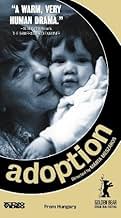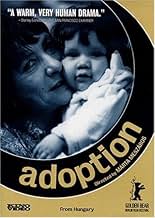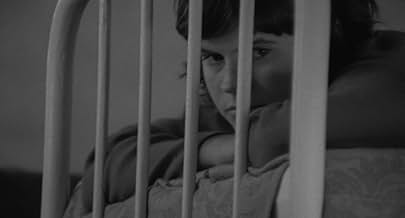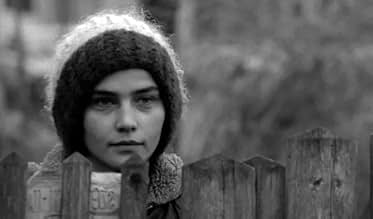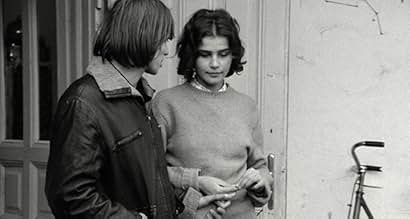IMDb RATING
7.2/10
1.6K
YOUR RATING
A lonely middle-aged woman wants to give birth to a child, but her acquaintance with dysfunctional teenagers leads her to the idea of adoption.A lonely middle-aged woman wants to give birth to a child, but her acquaintance with dysfunctional teenagers leads her to the idea of adoption.A lonely middle-aged woman wants to give birth to a child, but her acquaintance with dysfunctional teenagers leads her to the idea of adoption.
- Director
- Writers
- Stars
- Awards
- 4 wins & 1 nomination total
Katalin Berek
- Csentesné - Kata
- (as Berek Kati)
János Boros
- Anna apja
- (as Boross János)
Árpád Perlaky
- Orvos
- (as Dr. Perlaky Árpád)
- Director
- Writers
- All cast & crew
- Production, box office & more at IMDbPro
Featured reviews
One of the great films about women made by a woman, Marta Meszaros' "Adoption" is about the most fundamental need of many women, to be a mother. Kata is a 43 year old widow, living alone but having an affair with a married man who is not prepared to leave his wife. One day she asks him to father a child with her, which she will raise alone, but he refuses. Then she meets Anna, a young girl from the local boarding school, who asks Kata if she can use her house to meet her boyfriend. A friendship develops between them that might lead to all their problems being solved.
Meszaros shoots her film mostly in close-ups as if by focusing on these faces we are also getting inside their heads. It's an unusual treatment of an unusual subject, one that in an American film would have been sentimentalised out of all proportion. As Kata, Katalin Berek is extraordinarily good and the director, one-time wife of Miklos Jansco, never deviates from the intensity of her subject, making this a deeply moving film. Not much seen these days, this remains a key film of the seventies.
Meszaros shoots her film mostly in close-ups as if by focusing on these faces we are also getting inside their heads. It's an unusual treatment of an unusual subject, one that in an American film would have been sentimentalised out of all proportion. As Kata, Katalin Berek is extraordinarily good and the director, one-time wife of Miklos Jansco, never deviates from the intensity of her subject, making this a deeply moving film. Not much seen these days, this remains a key film of the seventies.
A single woman turned 40 wants a baby but has nobody to give her one. Her instincts displaced, she befriends a tearaway girl from a young offender's institution. The two women, each at a watershed in their lives, draw something from each other without being able to relate to each other properly.
It has an ungainly, unstructured feel to it more sentiment than substance - like a day imperfectly remembered, which amounts to a startling, artless realism. The smudgy black and white Hungarian landscape and sparse dialogue are forefunners of Tarr's, and there are some nicely observed characters. Women will connect with Meszaros' worldview: life as a forlorn struggle to be as benign as one might want to be, but inevitably held back by the sheer dourness of the world. So we make do with what we have and hope that things occasionally work out, as they do here. Winner of the Golden Bear.
It has an ungainly, unstructured feel to it more sentiment than substance - like a day imperfectly remembered, which amounts to a startling, artless realism. The smudgy black and white Hungarian landscape and sparse dialogue are forefunners of Tarr's, and there are some nicely observed characters. Women will connect with Meszaros' worldview: life as a forlorn struggle to be as benign as one might want to be, but inevitably held back by the sheer dourness of the world. So we make do with what we have and hope that things occasionally work out, as they do here. Winner of the Golden Bear.
10vincentw
As austere as any Bresson, this film shows Meszaros' brilliance as a filmmaker. The story is simple, the acting understated and powerful, the black and white photography masterful, the atmosphere strained and grey. Without once mentioning politics, it could not be a more powerful indictment of Communist society.
It is, a sad comment on the state of film distribution in this day and age that the works of Meszaros, the most prolific woman filmmaker of all time, should be so little available. Come on, Amazon, get with it!
It is, a sad comment on the state of film distribution in this day and age that the works of Meszaros, the most prolific woman filmmaker of all time, should be so little available. Come on, Amazon, get with it!
Beautiful black and white cinematography full of close-ups and the depiction of faces, details and of factory workers. Good acting depicting a sudden relationshipt that arises and develops between an unmarried woman who wants a baby (and her married boyfriend does not) and a teenager who has been abandoned by her parents and wants to marry her boyfriend. By helping and listening the latter, the former understands better her own situation and makes decisive decisions. I am not entirely convinced about the development of any of these two characters, and the so much mentioned troubled life of the girl and the labour condition of the woman seem not to seriously influence their attitude along the story. Script perhaps does not show enough coherence (the slap being the most gratuitous moment, perhaps) despite the slow time dedicated to dialogues.
Katalin Berek has a checkup She's 42 and wants to see if she can have a child. She wants one, but her lover doesn't. He is a married man, and they understand he's not going to leave his family. Miss Berek is trying to write a letter apologizing for upsetting him when Gyöngyvér Vigh walks into her life. Miss Vigh has her own letter, this one to her mother saying she's been neglected, and she is going off to lead her own life. Then, while she's putting her own life in order, she stays with Miss Berek.
Márta Mészáros's movie about what defines family is neither subtle nor deep, but watching Miss Berek figure it out on her own is rather interesting, and reasonably paced; I never grew impatient with her not getting it sooner. Even the 1970s depression that hangs over this movie and never quite lifts seems appropriate.
Márta Mészáros's movie about what defines family is neither subtle nor deep, but watching Miss Berek figure it out on her own is rather interesting, and reasonably paced; I never grew impatient with her not getting it sooner. Even the 1970s depression that hangs over this movie and never quite lifts seems appropriate.
Did you know
- TriviaIncluded in the Criterion Collection, Spine #1115.
- ConnectionsFeatured in Women Make Film: A New Road Movie Through Cinema (2018)
- How long is Adoption?Powered by Alexa
Details
- Runtime
- 1h 29m(89 min)
- Color
- Sound mix
- Aspect ratio
- 1.85 : 1
Contribute to this page
Suggest an edit or add missing content


